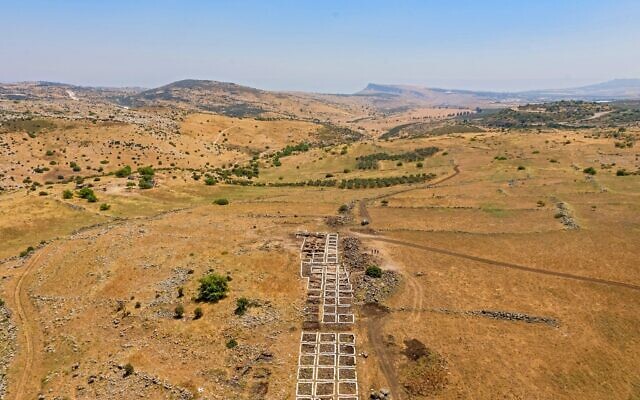What caused a family to pick up and abandon their farm 2,100 years ago in the eastern Galilee?
An unprecedented Hellenistic-era farmstead uncovered during recent excavations — frozen in time — offers invaluable insight into the daily life of the Hasmonean period, said Israel Antiquities Authority archaeologist Dr. Amani Abu-Hamid on Wednesday.
Just what made the family of still unknown origins pack up its precious belongings and quickly flee — leaving behind evidence at Horbat Asad of their everyday occupations through piles of loom weights and other domestic artifacts including large vessels and iron farm tools — is fodder for more research, said Abu-Hamid.
“We were very lucky to discover a time capsule, frozen in time, in which the finds remained where they were left by the occupants of the site, and it seems that they left in haste in face of an impending danger, possibly the threat of a military attack,” she said.
Abu-Hamid is the director of a salvage excavation taking place next to Nahal Arbel ahead of a NIS 910 million Northern Carrier project, conducted by the Mekorot water company, aimed at pumping desalinized water from the Mediterranean Sea into the Sea of Galilee to aid agriculture and homes.
Until now, there were no remains from this period in the Galilee, Abu-Hamid said. “It is a very important and valuable site to teach us about the spread of the Hasmonean Empire and daily life in the Hellenistic period,” she said, referencing historical sources that state that the Judean Hasmonean Kingdom expanded into the Galilee.
The excavation uncovered coins which, when cleaned, may give a more specific dating to the site. The place was abandoned, she said. Fallen stones preserved the artifacts and only parts of the structure’s stones were removed.
Also uncovered during the dig were remains of a rather substantial 10th century BCE Iron Age agricultural settlement, she said. In addition to loom weights and cooking pots, her team discovered organic samples, which are being sent for carbon-14 dating, she said. Initial dating was made through ceramic typology.

Hellenistic-era farmstead uncovered in the Galilee during salvage excavations ahead of a pipe bring desalinized water to the Sea of Galilee. (Assaf Peretz, Israel Antiquities Authority)
We do not yet know which peoples populated either of the two settlement levels found at the site, said Abu-Hamid. “Everything shows both periods were agriculturally based,” she said. With the preponderance of loom weights, she assumes they kept flocks of sheep and goats.
As to what the future of the site will be, said Abu-Hamid, at this point the IAA and Mekorot are evaluating all possibilities to decide what to do after all documentation of finds is concluded.
Director general of the Israel Antiquities Authority Eli Eskosido said in a press release, “The Israel Antiquities Authority and Mekorot are cooperating to preserve the farmstead, at the site itself or in the immediate vicinity.”
